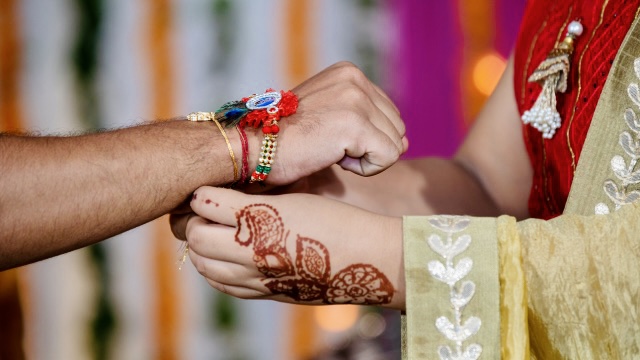What is Raksha Bandhan ?
Raksha Bandhan (or Raksha Bandhana) is a Hindu festival that celebrates the relationship between brothers and sisters, and families, on the full moon of the Hindu month of Shravana (Shravan Poornima), or around July and August. This day is also called Brother and Sister Day.
The origins of the Raksha Bandhan festival are rooted in various historical and mythological narratives.
Krishna and Draupadi: One of the most well-known stories is from the Hindu epic, the Mahabharata. According to this tale, when Lord Krishna cut his finger while handling sugarcane, Draupadi, the wife of the Pandavas, tore a piece of her sari and tied it around his finger to stop the bleeding. Touched by her concern, Krishna promised to protect and support her in return. This incident is often cited as an example of the pure and selfless bond between a brother and a sister, and it is believed to have laid the foundation for the Raksha Bandhan tradition.
Indra and Sachi: Another story comes from ancient Indian mythology, where the king of gods, Indra, was facing defeat in a battle against the demons. His wife, Sachi, tied a protective thread around his wrist to grant him strength and protection. Indra emerged victorious, and this event is considered to symbolize the concept of Raksha Bandhan.
Yama and the Yamuna: In another myth, the God of Death, Yama, did not visit his sister Yamuna for 12 years. When he finally visited her, moved by the warmth of the reception, Yama granted her a boon. In return, Yamuna tied a thread around Yama’s wrist and prayed for his well-being. Yama was so touched by her gesture that he declared that anyone who receives a rakhi and protection thread from a sister on this day will be blessed and protected.
In the Bhagavat Puran and Vishnu Puran, after Vishnu conquers the three world from King Bali, King Bali asks Vishnu to live in his palace. Goddess Lakshmi, Vishnu’s wife, is not happy about this arrangement. She ties a rakhi on King Bali making him a brother. Honored by the gesture, King Bali grants her a wish.
Rani Karnavati and Emperor Humayun: This story dates back to the 16th century. Rani Karnavati, the queen of Mewar, sent a rakhi to Emperor Humayun when her kingdom was under threat. Touched by her plea, Humayun sent his troops to protect her kingdom. This is often cited as an example of how the Raksha Bandhan tradition extends beyond biological relationships.
These stories, among others, have contributed to the diverse cultural significance of Raksha Bandhan. Over time, the festival has evolved and is celebrated in various ways across different regions of India and other parts of the world. The common theme in these stories is the bond of protection, care, and love between siblings, which remains at the heart of Raksha Bandhan celebrations.
Raksha Bandhan, also known as Rakhi, is a Hindu festival that celebrates the bond between siblings, especially between brothers and sisters. The festival is observed on the full moon day of the Hindu lunar month of Shravana, which typically falls in August.
The central ritual of Raksha Bandhan involves the sister tying a decorative thread called a “rakhi” around her brother’s wrist. The act of tying the rakhi symbolizes the sister’s love and prayers for her brother’s well-being, and in return, the brother promises to protect and support his sister throughout her life.
Raksha Bandhan holds cultural and emotional significance, highlighting the strong bond between siblings and reinforcing family ties. It’s a joyful occasion that brings families together, and it’s celebrated with enthusiasm across India and by Indian communities worldwide.
“A wife/girlfriend can tie rakhi to her husband/boyfriend.” In fact, not just between husband and wife, the rakhi can also be tied between a daughter and her father, as well as between a spouse. This is because Rakhi or RAKSHA-BANDHAN is a thread that symbolises the promise of protection.

